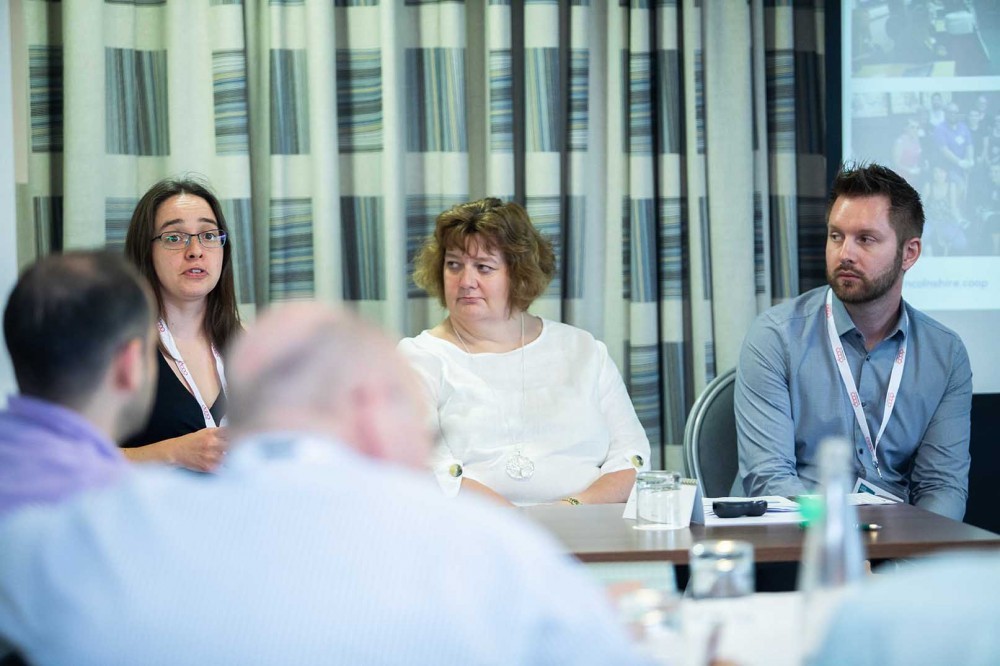Suma, the UK’s largest independent wholefood wholesaler, has recently embarked on a leadership development journey – and doing this in a co-operative way can be a challenging process.
Jenny Carlyle, strategic HR officer at Suma, shared some of the co-op’s key learnings during a session at Co-op Congress in Manchester in June.
Suma was converted into a co-op in 1977, after its founder sold it to staff two years after setting it up. Since then, the business has been run as a worker
co-op, operating an equal pay policy.
Ms Carlyle surveyed colleagues to find out what they thought about leadership. She found that worker owners wanted leadership and although they did not know what that might look like, they all pointed to the idea of collective leadership.
This approach means that anybody can be a leader at any time; individuals step into leadership roles when appropriate or when there is a need in the organisation. When that need is over they will step back and continue what they were doing before.
“The idea of collective leadership resonated with our values and principles and our structure,” said Ms Carlyle.
Meanwhile, the co-op’s equal pay policy meant people chose to take extra roles for the good of the organisation rather than for financial incentives.
Ms Carlyle started looking at how Suma could develop collective leadership, and asking what was stopping people from stepping into leadership roles. The survey revealed the main barriers were a lack of support and role clarity, with people stepping in and filling in roles as needed,
without guidance.
In light of this, Suma started a governance restructure to give people very clear responsibilities. It is now run by a board of nine people, replacing its former management committee of six. Those who wish to stand for the board have to complete a skills assessment in relation to the job description. Colleagues also need to second the application and explain why they think the person is suitable. The new process was devised to balance legal responsibilities, good competence and democratic rights.

Suma has also set up a learning and development team, looking at membership skills within the co-op and trying to incorporate elements
of coaching and reflective practice.
While still at a very early stage of leadership development, the co-op is focusing on involving and supporting everybody wanting more responsibilities.
Ms Carlyle says a key lessons is that it is important to identify what leadership means for an organisation and what leaders are expected to do.
“Tailor existing leadership development literature to your skills and organisation,” she told delegates.
Elsewhere in the movement, Lincolnshire Co-op is recruiting people at mid-career stage, particularly in food store and managerial roles.
“They come from the plc world with the expectation to invest massively in technology, not necessarily in people or values,” said Heather Lee, the society’s head of people and performance.
With its purpose in mind, Lincolnshire developed a nine-box talent matrix to define what they are looking for in employees. “Developing people is key to us and how we go about delivering our purpose,” she added.
Three years ago, the society launched a Learn, Engage, Apply and Perform programme (LEAP) to help colleagues step up to store manager roles. Through the scheme, staff members can apply for an 18-month training process to develop their skills further.
Some choose not to be store managers, while others opt for the promotion and go on to complete a level 3 retail team leader diploma in partnership with
a local college.
Those who come through the scheme can do a chartered manager degree apprenticeship BA through the University of Lincoln. As an apprenticeship levy-paying employer, Lincolnshire Co-operative is using some of levy funding for these projects.
Gavin Wilson, one of regional managers in the food business, was one of the first Lincolnshire staff members to apply for the LEAP programme. He started with an initial chat to his line manager, who asked about his development and where he wanted to be in the future. He said the scheme had boosted his confidence and given him the opportunity to network and make new contacts within the business.
Other colleagues have chosen to move into head office roles through the scheme.
Richard Bickle, a director at Central England Co-operative, pointed out that retail societies’ junior-to-senior schemes do not exist in the way that they used to, particularly due to the advancement of the national living wage.
“Are there lessons that the retail societies can learn from people like Suma – who by definition are a flat organisation?” he asked.
Ms Carlyle argued that while the job rotation approach worked for Suma, it might prove to be wrong for a co-op with a traditional hierarchy.
“Sometimes when traditional pathways are no longer an option, you just have to look for different ways,” she said, adding that working in the frozen section for a few days a week can give workers an insight into what to want from a buyer.
“The advantage is that there is no financial penalty in Suma when moving within different roles,” she added.
Ms Lee said that LEAP helped those working in stores who wanted to become store managers. Meanwhile, the chartered management degree helped people who were in mid-career roles. “It is about the line manager having regular conversations with individuals to identify their aspirations,” she said.
Lincolnshire store managers who have come through these schemes have much have higher retention and success rate. The society’s current chief executive, Ursula Lidbetter, was herself a trainee when she joined the organisation.